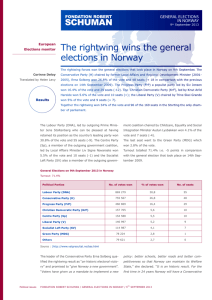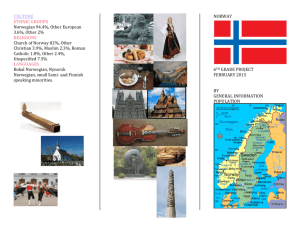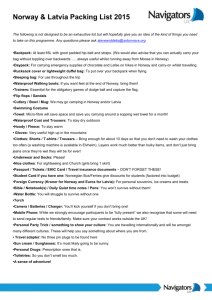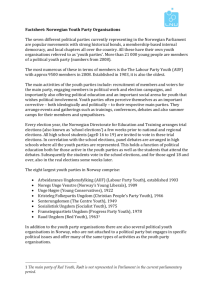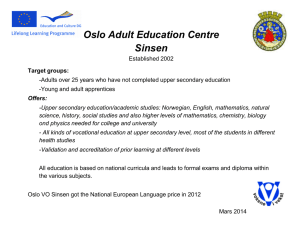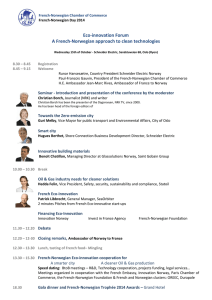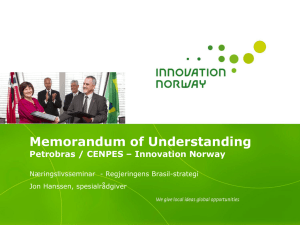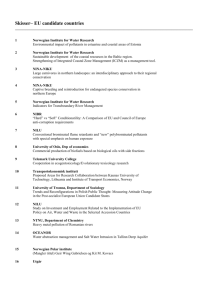General elections in Norway
advertisement
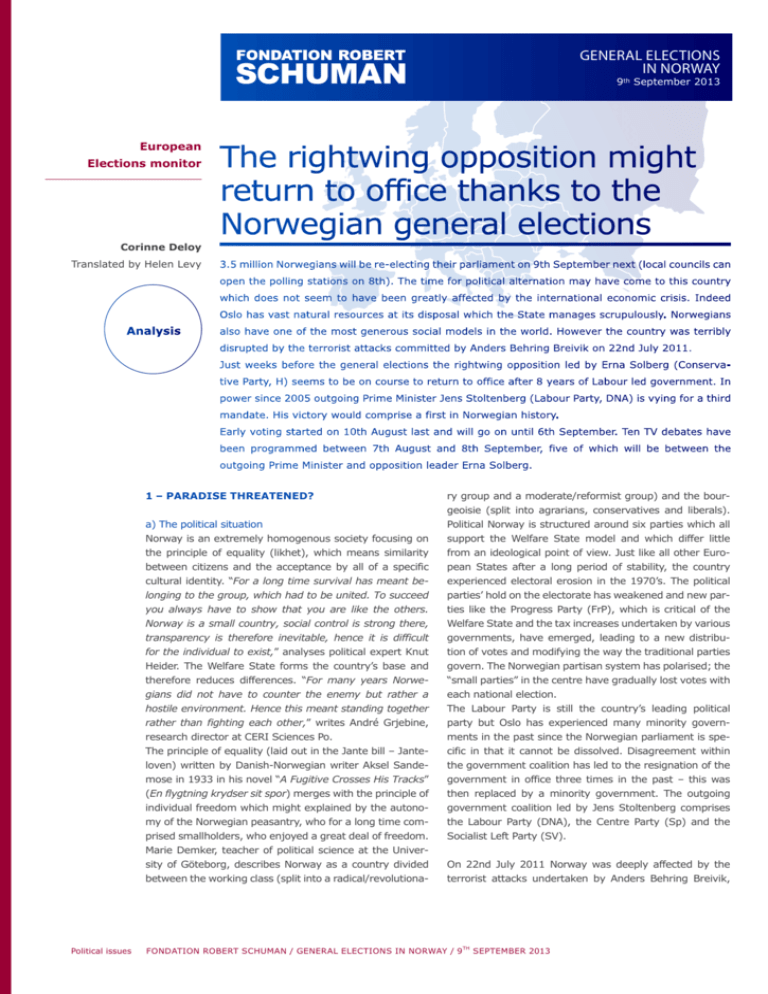
GENERAL ELECTIONS IN NORWAY 9th September 2013 European Elections monitor Corinne Deloy Translated by Helen Levy The rightwing opposition might return to office thanks to the Norwegian general elections 3.5 million Norwegians will be re-electing their parliament on 9th September next (local councils can open the polling stations on 8th). The time for political alternation may have come to this country which does not seem to have been greatly affected by the international economic crisis. Indeed Oslo has vast natural resources at its disposal which the State manages scrupulously. Norwegians Analysis also have one of the most generous social models in the world. However the country was terribly disrupted by the terrorist attacks committed by Anders Behring Breivik on 22nd July 2011. Just weeks before the general elections the rightwing opposition led by Erna Solberg (Conservative Party, H) seems to be on course to return to office after 8 years of Labour led government. In power since 2005 outgoing Prime Minister Jens Stoltenberg (Labour Party, DNA) is vying for a third mandate. His victory would comprise a first in Norwegian history. Early voting started on 10th August last and will go on until 6th September. Ten TV debates have been programmed between 7th August and 8th September, five of which will be between the outgoing Prime Minister and opposition leader Erna Solberg. 1 – PARADISE THREATENED? Political issues a) The political situation Norway is an extremely homogenous society focusing on the principle of equality (likhet), which means similarity between citizens and the acceptance by all of a specific cultural identity. “For a long time survival has meant belonging to the group, which had to be united. To succeed you always have to show that you are like the others. Norway is a small country, social control is strong there, transparency is therefore inevitable, hence it is difficult for the individual to exist,” analyses political expert Knut Heider. The Welfare State forms the country’s base and therefore reduces differences. “For many years Norwegians did not have to counter the enemy but rather a hostile environment. Hence this meant standing together rather than fighting each other,” writes André Grjebine, research director at CERI Sciences Po. The principle of equality (laid out in the Jante bill – Janteloven) written by Danish-Norwegian writer Aksel Sandemose in 1933 in his novel “A Fugitive Crosses His Tracks” (En flygtning krydser sit spor) merges with the principle of individual freedom which might explained by the autonomy of the Norwegian peasantry, who for a long time comprised smallholders, who enjoyed a great deal of freedom. ry group and a moderate/reformist group) and the bourgeoisie (split into agrarians, conservatives and liberals). Political Norway is structured around six parties which all support the Welfare State model and which differ little from an ideological point of view. Just like all other European States after a long period of stability, the country experienced electoral erosion in the 1970’s. The political parties’ hold on the electorate has weakened and new parties like the Progress Party (FrP), which is critical of the Welfare State and the tax increases undertaken by various governments, have emerged, leading to a new distribution of votes and modifying the way the traditional parties govern. The Norwegian partisan system has polarised; the “small parties” in the centre have gradually lost votes with each national election. The Labour Party is still the country’s leading political party but Oslo has experienced many minority governments in the past since the Norwegian parliament is specific in that it cannot be dissolved. Disagreement within the government coalition has led to the resignation of the government in office three times in the past – this was then replaced by a minority government. The outgoing government coalition led by Jens Stoltenberg comprises the Labour Party (DNA), the Centre Party (Sp) and the Socialist Left Party (SV). Marie Demker, teacher of political science at the University of Göteborg, describes Norway as a country divided between the working class (split into a radical/revolutiona- On 22nd July 2011 Norway was deeply affected by the terrorist attacks undertaken by Anders Behring Breivik, FONDATION ROBERT SCHUMAN / GENERAL ELECTIONS IN NORWAY / 9TH SEPTEMBER 2013 General elections in Norway 9th September 2013 which led to the death of 77 and injured 151. Breivik set off a bomb in the centre of Oslo which destroyed part of the government building. After this he proceeded to the island of Utoya where he murdered 69 people who were taking part in a camp organised by the Labour Party’s youth league. He justified his acts saying that he wanted to counter Islam and multi-culturalism. On the same day he broadcast a manifesto on the internet comprising 1,518 pages in which he defended an ultra-nationalistic, Christian fundamentalist ideology. Breivik had previously joined the populist Progress Party in 1999 before being banned seven years later. From 2002 to 2004 he managed the party’s youth movement in his home town. These attacks were the bloodiest catastrophe that Norway had witnessed since the Second World War. On 24th August Breivik was found responsible for his acts and sentenced to the maximum sentence in Norway – 21 years (with a possibility of the sentence being extended). In August 2012 an independent committee concluded that the attacks might have been prevented and the terrorist arrested earlier if the government had applied security measures which had already been approved. Several years prior to this it was decided to close Grubbegata Street to traffic since it runs alongside the government’s headquarters. In March 2013 a parliamentary report on the fight to counter terrorism advocated the creation of an operational emergency management centre as well as an increase in the number and training of police patrol forces. In this area of tranquillity which Norway embodies (31 murders amongst a population of 4.7 million in 2010), the police are not armed. In all an exceptional package of 109 million krone were approved in response to the criticism made of the government. On 5th March last the Norwegian Parliament unanimously adopted a text criticising the attitude adopted by the authorities during the attacks on 22nd July 2011: “the Storting (parliament) deems that criticism of the authorities before and after the attacks is justified in that they did not implement security and intervention measures that might have prevented the attacks and protected the people who were present at the government’s HQ and on the island of Utoya.” 2 The Norwegians understood that one of their fellow countrymen wanted to destroy the Norwegian model. Anders Breivik said that the also wanted to kill Gro Harlem Brundtland, a former Prime Minister (1981-1989 and 1990-1996), who is considered in Norway to be the mother of the nation. She was on Utoya where she delivered a speech to the young Labour supporters just hours before the terrorist’s arrival. 27 survivors of the massacre are standing in the elections on 9th September and 3 are electable. “Norway represents a tolerant, consensual model of so- Political issues ciety. On the other hand however the underlying conformism prevents any other opinion from being heard. It was impossible to foresee the Breivik phenomenon but it is clear that in this country which is reputed for its peaceful tranquillity the tension expressed is all the stronger since it has been repressed for so long,” analyses André Grjebine. b) The Socio-Economic Situation With a population of 5 million and a GDP per capita of 41,416 € (IMF figures 2012), Norway is the fourth wealthiest country in the world. National macro-economic statistics are stable: GDP growth of 3.5% last year (3% forecast this year), unemployment lies at 3.4% (May 2013) and the average annual income is 42,160 €. Since 2000, the latter figure has literally rocketed: + 63%. It is 60% higher than the European average. The explanation for this miracle lies in part in the natural hydrocarbon reserves which the country possesses. It is the seventh biggest oil export country in the world and Western Europe’s leading supplier of oil and gas. Norway has the highest amount of sovereign funds in the world (around 550 billion €) which is divided in two: the Government Pension Fund-Norway, which invests in local companies and supports the national economy and the Government Pension Fund-Global, which invests in many companies on the international financial markets according to strict ethical principles, which proscribe for example participation in businesses which infringe environmental laws or which are involved in the production and sale of arms, tobacco and even those which employ children. These sovereign funds comprise a reserve for the country’s future requirements. The 4% rule (handlingsregelen) prevents the government in office from using more than 4% of the value of the funds per year. The outgoing coalition has in the past rejected a draft bill that planned to reduce this cap to 3%. In all only 11% of the public spending budget relies on the money produced by hydrocarbons. A committee was launched on 9th August last to look into existing investments and the ways to improve their productivity. Since 1998 the annual yield of the sovereign funds has been 3.17%, which is below the 4% goal set by Parliament. The Norwegian economy is boosted by the vigour of the oil services sector. Its good health fosters wage increases and reductions in working hours which in fine leads to a loss of competitiveness. The country’s employment level is extremely low (61%). The sharp rise in wages and the decrease in the number of hours worked (270 less per year since 1974) has led Norwegian businesses to raise their prices in compensation for these two phenomenon. The government has also threatened to use the sovereign FONDATION ROBERT SCHUMAN / GENERAL ELECTIONS IN NORWAY / 9TH SEPTEMBER 2013 General elections in Norway 9th September 2013 funds if productivity did not increase by 10%. The IMF has warned Oslo. The country has to rise to four major challenges: rising unemployment, the danger of a collapse in growth in the country’s two main economic sectors (oil and real estate – the price of the purchase of an apartment has more than doubled in Oslo since 2000), rising wages, which are driven along by the oil sector thereby threatening the competitiveness of other industries and finally the burden of public spending notably that related to the ageing population. Norway is now calling on immigration to fill certain positions but this is not enough to compensate for staff shortages. According to some economic analysts around 6000 engineering positions might still be vacant in 2016. Political and economic stability has always been one of the country’s main assets and has always enabled it to attract foreign investments. But Oslo is still greatly dependent on the world economy and is suffering because of the debt crisis in the European Union. “Norway cannot cut itself off from external events. The best option is to keep our house in order. I agree with the IMF that we have to spend the revenues produced by oil carefully to help those sectors that are vulnerable,” declared Finance Minister Sigbjorn Johnsen (DNA). In 2013, according to the Finance Bill approved on 7th May last, the government is to use 3.3% of the sovereign fund. But the country must diversify its economic activities to reduce its dependency on natural resources which are on the decline: the exhaustion of deposits in the North Sea will reduce oil production to its lowest level in 25 years this year. On 21st April last Labour gave the go-ahead to the launch of a study on the impact of new oil drilling off the protected islands of Lofoten, Vesteraalen and Senja, 200km to the north of the Arctic Circle. All of the “big” political parties support oil drilling on the Lofoten Islands (“You cannot light or extinguish the oil industry. It needs stable access to new regions. We think it is possible to combine oil interests with those of the fishermen;” declared the leader of the Conservative Party, Erna Solberg) whilst the small parties are against it. They maintain that oil production will damage the region’s fishing industry and threaten several thousand jobs. They also say that oil and the chemical waste might damage fish stocks (the Lofoten Islands have the biggest stock of cod in the world). Moreover opponents to the drilling project highlight that working conditions in the Arctic waters are difficult and costly. Finally the Lofoten Islands are unique reefs which attract many tourists yearly. Oil production would also threaten many jobs in this sector. The main criticism made by the Norwegians of their government involves the low rate of public investment. Indeed although the country is wealthy this is not always visible either in its infrastructures or in its public services. Many citizens think that the authorities have not invested enough in the country and complain of the poor quality of the roads, the poor functioning of the railway system, of the time it takes to access healthcare likewise the lack of investment in schools and universities. 3 2 – HAS THE TIME COME FOR THE RIGHTWING? “A chance for all”, “New ideas, better solutions,” these are two of the slogans launched by the main Norwegian opposition party. Over the last few years the Conservative Party has repositioned itself and Erna Solberg has fought to modernise his party which is suggesting a reform of the country, notably from a fiscal point of view, whilst maintaining budgetary rigour without sacrificing the Norwegian social model. The Conservatives also support the European Union even though their leader has said that she would not organise another referendum on this issue if she became Prime Minister. They are campaigning against the poor state of the public health and education services. They would like to develop nurseries and private schools but maintain that they do not want to privatise the healthcare system. They do however want patients to have the choice between public and private care. In terms of infrastructures they want to develop public transport and support the building of a high speed train in the Oslo region (to link Lillehammer to Halden and Skien) as well as new roads thanks to funding that includes both public and private sources. “We invest too little in research, development, infrastructures and all other things which we need economically,” indicated Erna Solberg who warned against relying too much on the hydrocarbon industry. The opposition is considering the division of the Government Pension Fund-Global into several different funds which might invest in the country’s infrastructures. Jan Tore Sanner (H), the leader of the Conservative Party’s parliamentary group and spokesperson for finance suggested this in an interview with the British daily The Financial Times on 30th June last Erna Solberg expressed similar thoughts on this. “We are a party which believes in competition. If you align several runners you would have more competition and this would help us see who achieves the better result,” she declared. The structure of the sovereign fund was created in 1996 and has barely changed since then (investments on the emerging markets started in 2000 and in real estate in 2011). The Conservative Party is also suggesting a 51% reduction of State involvement in Statoil, the country’s biggest energy company. It supports tax reductions (to a total of 25 billion krone, ie 3.17 billion €) and the relief of the burden that weighs on businesses. It wants to reduce or do away with controversial taxes on business assets which discourage property and savings and damage competitiveness and also inheritance taxes deemed to be 9TH SEPTEMBER 2013 / GENERAL ELECTIONS IN NORWAY / FONDATION ROBERT SCHUMAN Political issues General elections in Norway 9th September 2013 unfair. The Conservatives are suggesting a reduction on wealth tax to protect small companies and house owners: they want to raise the threshold as of which a person has to pay this tax to 25 million krone (870,000 krone at present). With this new threshold almost all of the present tax payers (99%) would be exonerated. Erna Solberg’s party also wants Norwegians who belong to a union (i.e. 54.6% of the population in 2011 according to OECD figures) to be able to deduct their membership fees from their taxes. It supports a more active European policy and a change to the international development policy. It would like to reduce the number of recipient countries, notably highlighting the respect of Human Rights. Finally the Conservatives want to make the employment of temporary workers easier and to foster the merger of town councils in order to reduce bureaucracy and improve the effectiveness of the Norwegian civil service. 4 If the right wins on 9th September Svein Tore Marthinsen, a political expert forecasts three possible coalitions: the first bringing together the Conservative Party, the Progress Party and the Christian Democratic Party (KrF) and the Liberal Party (V); a second would bring together the Conservative Party and the Progress Party or a government comprising Conservatives only. The last possibility is the least credible. Many analysts think that the Conservative Party and the Progress Party will not win enough votes together to form a majority. Erna Solberg has said that she would like to form a government with all of the right. “I would prefer a four party coalition which has a majority in parliament,” she declared. The Christian Democratic Party and the Liberals are still reticent however about an alliance with the populist party. On 12th August last the Christian Democratic Party leader, Knut Arild Hareide, indicated that in his opinion a government rallying the Conservatives to the Progress Party alone would be “worse” than the outgoing government. The preference of the Christian Democratic Party which is divided between a liberal and a more conservative wing leans towards a coalition with the conservatives alone. The party’s leader is too distant from the Progress Party regarding many issues in order to govern with the populists. However according to former Christian Democratic Party Prime Minister (1997-2000 and 2001-2005) Kjell Magne Bondevik, the most important matter would be to influence the policy undertaken even if this means sharing power with the Progress Party. As usual the Christian Democratic Party is campaigning on the defence of family values. They want to a reorganisation of parents’ working hours and are asking for example that parents of children under three might stay at home Political issues one day per week. They are also campaigning for the protection of the healthcare system and a reduction in the production of oil and gas. 3 – IS THE LABOUR PARTY A VICTIM OF ITS TIME SPENT IN OFFICE? Congratulated for his management of the crisis after the attacks on 22nd July 2011, Jens Stoltenberg has become increasingly unpopular in the polls over the last few months. The outgoing Prime Minister has been criticised for his inefficacy before the massacre which, according to a parliamentary report, might have been prevented in part. His name has also appeared in several affairs, he has also committed some faux-pas. The other two parties in government, the Centre Party and the Socialist Left Party – suffered the same fate as they have fallen in the polls and this led to tension between the three parties in the government coalition. The government is especially being criticised because of the state of the country’s infrastructures notably in terms of transport (the delay in building roads and railways) and in the healthcare sector (little progress in the reform of the hospital sector), but also because of the rise in taxes on imported products such as meat and cheese. Jens Stoltenberg decided to reduce corporate tax by one point on companies domiciled in Norway – a first since 1992. He announced that this action was the start of a major restructuring of corporate tax. He also said that he wanted the wage negotiation process to be modified. In his opinion the hydrocarbon industry cannot and should not set the standard in terms of wage negotiations in the country. With the slogan “Alle skal med” (We shall take care of each of you) the outgoing Prime Minister intends to achieve a third term in office. He is highlighting his experience. Falling behind in the polls the outgoing Prime Minister dressed as a taxi driver and drove a few people, who did not know who their driver was, from one point in Oslo to another. The video of this original campaigning method was posted on the internet on 11th August last. The idea was to “listen to what people really thought”. There was a slight hiccough though. It was later revealed that the Jens Stoltenberg’s passengers had been selected during a casting and paid (500 krone, around 63€). They did not know what they were going to experience but they had accepted to take part in a video for the Labour Party. The latter defended itself by saying that the use of a casting had proven vital in order to be able to represent the diversity of the population. Unlike in the previous general elections in 2005 and 2009 the Socialist Left Party (SV) led by the Minister for Childhood, Equality and Social Insertion, Audun Lysbakken, FONDATION ROBERT SCHUMAN / GENERAL ELECTIONS IN NORWAY / 9TH SEPTEMBER 2013 General elections in Norway 9th September 2013 chose not to campaign alongside the Labour Party. The rather than on foreign financial markets” according to Siv outgoing Prime Minister did however say that there was Jensen. She wants to create an independent public fund no problem between the two parties. The Labour Party’s for infrastructures and increase spending on the police strategy undoubtedly aims not to scare off any voters who forces, care for the elderly (the latter may enjoy the right might be hesitating. to a place in a retirement home) and schools. She wants The Socialist Left Party wants the sovereign funds to end however to reduce international aid, aid granted to far- investments in hydrocarbon companies and to place them mers and to cultural activities and finally to privatise the in renewable energies. It has chosen to promote Norwe- national railway company (NSB) and the national radio-TV gian values to show that they can be assimilated by eve- company (NRK). ryone, whatever their skin colour or religion. The Progress Party’s programme also suggests a reduc- 5 tion in taxes (around 100 billion krone ie 12.68 billion €) The Centre Party led by Local Affairs Minister, Liv Signe because 57% of its supporters believe that the taxation Navarsete supports Oslo’s withdrawal from the Schengen level is too high in Norway lying at a national average of Agreements and is asking for greater powers to control 28% – a reduction in taxes on imports set by the govern- criminal groups on the Norwegian border as well as tighter ment, a reduction in immigration and action to counter controls in airports. According to the Centrists, one third what Siv Jensen calls the snikislamiering (the rampant of the prisoners held in the kingdom are foreigners. The Islamification of society). “Jens Stoltenberg speaks freely authoritarian policy put forward by the party is attracting of the Norwegian model. The Progress Party speaks of the less and less voters however. Norwegian people,” stressed Siv Jensen during the party’s The centrists are also fighting for greater support for rural annual congress in Gardermoen. regions and more local autonomy. They support development aid for the sick and the elderly. The traditional core 5 – THE NORWEGIAN POLITICAL SYSTEM of the centrist electorate – many of them farmers – distanced themselves from the party when Jens Stoltenberg’s The Norwegian Parliament (Storting) has been monoca- government reduced the aid they had been granted. Some meral since the general elections on 14th September 2009 joined the Christian Democratic Party. (amendment of the Constitution of 20th February 2007) and comprises 169 members. MPs are elected every four 4 – AND WHAT ABOUT THE POPULIST FAR RIGHT? years from a proportional list of seats according to the modified Sainte-Lagüe system. 150 MPs are appointed within The Progress Party is in a paradoxical situation. Its rappro- 19 fylker (counties) which form as many constituencies chement to the Conservative Party has been to its detri- each electing between 5 (Finnmark and Sogn og Fjordane) ment and has led to a loss of votes in the polls. According and 17 representatives (Oslo) depending on their size and to the polls a quarter of the party’s former voters were the number of inhabitants. To bring representation in line about to vote for Erna Solberg’s party on 9th Septem- as much as possible with the vote of the people, 19 MPs ber next. However the Progress Party has never been as (one per constituency) are appointed nationally and are close to power as this. Indeed it might make its debut in from the political parties which are under-represented in government if the rightwing win these general elections. the constituencies. These are called compensatory seats. Its leader Siv Jensen, who is targeting the post of Finance A political party has to win at least 4% of the votes cast Minister, maintains that her party would not support a nationally in order to take part in the distribution of com- rightwing government of which it was not a member. For pensatory seats. The Norwegian electorate has the right the time being she is trying tempt back her electorate to to modify the order of the candidates featuring on the the fold with the slogan “Let’s revive Norway.” electoral lists; the order of the candidates decided previously by the party remains decisive most of the time. The Progress Party stands apart from the other Norwegian To take part in the general election in a constituency all political parties in that it is suggesting greater use of the political parties must win 500 votes (or more than 5 000 sovereign funds to “invest in the country’s infrastructures nationally) and present the signature of two members 9TH SEPTEMBER 2013 / GENERAL ELECTIONS IN NORWAY / FONDATION ROBERT SCHUMAN Political issues General elections in Norway 9th September 2013 06 of the board of the local branch of the party. The parties – The Conservative Party (H) created in 1884, an oppo- which do not fulfil criteria have to collate the signature of sition party chaired by former Local Affairs and Regional 500 voters enrolled in the constituency. A candidate can Development Minister (2001-2005), Erna Solberg, has 30 run in several constituencies. MPs; The King of Norway who is not considered a citizen is not – The Socialist Left Party (SV), founded in 1975 and an allowed to vote. The queen and the prince can vote but outgoing government member led since 11th March 2012 generally prefer not to. by Childhood, Equality and Social Insertion Minister, Audun Lysbakken, has 11 seats; At present seven political parties are represented in the – The Centre Party (Sp), a former agrarian party founded Storting; in 1920, chaired by Local Affairs Minister Liv Signe Navar- – The Labour Party (DNA) created in 1887 and led since sete, member of the government coalition has 11 seats; 2002 by outgoing Prime Minister Jens Stoltenberg, has 61 – The People’s Christian Party (KrF), founded in 1933, an MPs; opposition party led by Knut Arild Hareide has ten seats; – The Progress Party (FrP), founded on 8th April 1973 and – The Liberal Party (V), founded in 1884, is the oldest led by Siv Jensen since 2006, is a far right party. It has party in Norway. Chaired by Trine Skei Grande, it has 2 41 seats; seats. Reminder of the general election results of 14th September 2009 in Norway Turnout: 76.40% No. of votes won % of votes won No. of seats Labour Party (DNA) Political Parties 949 049 35.4 64 Progress Party (FrP) 614 717 22.9 41 Conservative Party (H) 462 458 17.2 30 Socialist Left Party (SV) 166 361 6.2 11 Centre Party (Sp) 165 006 6.2 11 Christian Democratic Party (KrF) 148 748 5.5 10 Liberal Party (V) 104 144 3.9 2 85 985 2.7 0 Others Source : http://www.regjeringen.no/krd/html/valg2009/bs5.html Political issues The poll undertaken by the VG institute is forecasting and loves to repeat to the electorate that Labour allied a clear lead for the rightwing. According to the survey to the Centrists and Socialists are perfectly capable of the Conservative Party is due to win 31.9% of the vote governing the country. ahead of the Labour Party with 27.5% of the vote. The The Conservative Party pulled ahead of Labour in the Progress Party is due to come third with 14.2% of the polls for the first time in May 2012. It is the leading vote. Far behind the Liberal Party is due to win 5.6% party amongst the young (the under 30 year olds): of the vote; the Christian Democratic Party 5.5% and 31.3% of them say they will vote for Erna Solberg’s the Centre Party 5.3%. Finally the Socialist Left Party party whilst 23% say they will vote for Labour. Nearly would be excluded from Parliament since it is due to half of the electorate under 30 did not turn out to vote win 3.3% of the vote. Together the rightwing would win in the last general election on 14th September 2009. 57.2% of the vote (43% without the Progress Party) “The Norwegians are ready to dismiss Jens Stoltenberg against 36.1% for the leftwing forces. It remains to be because they want change. They are not disappoin- seen whether the four rightwing parties will accept to ted, they are rather tired of the present government,” join forces and succeed in forming a government toge- analyses Johannes Berg, a political expert at the Social ther. Outgoing Prime Minister Jens Stoltenberg is not Research Institute in Oslo. “There has been a turn to hesitating to use the confusion that sometimes reigns the right over the last ten years. People want to try within the opposition involving post-electoral alliances something out with the parties on the right,” he adds. FONDATION ROBERT SCHUMAN / GENERAL ELECTIONS IN NORWAY / 9TH SEPTEMBER 2013 General elections in Norway 9th September 2013 The rightwing wins the general elections in Norway 07 The rightwing forces won the general elections that took place in Norway on 9th September. The Conservative Party (H) chaired by former Local Affairs and Regional Development Minister (20012005), Erna Solberg won 26.8% of the vote and 48 seats (+ 18 in comparison with the previous elections on 14th September 2009). The Progress Party (FrP) a populist party led by Siv Jensen won 16.4% of the vote and 29 seats (-12). The Christian Democratic Party (KrF), led by Knut Arild Hareide won 5.6% of the vote and 10 seats (=); the Liberal Party (V) chaired by Trine Skei Grande Results won 5% of the vote and 9 seats (+ 7). Together the rightwing won 54% of the vote and 96 of the 169 seats in the Storting the only chamber of parliament. The Labour Party (DNA), led by outgoing Prime Minis- ment coalition chaired by Childcare, Equality and Social ter Jens Stoltenberg who can be pleased at having Integration Minister Audun Lysbakken won 4.1% of the retained its position as the country’s leading party won vote and 7 seats (-4). 30.8% of the vote and 55 seats (-9). The Centre Party The last seat went to the Green Party (MDG) which (Sp), a member of the outgoing government coalition, won 2.8% of the vote. led by Local Affairs Minister Liv Signe Navarsete won Turnout totalled 71.4% i.e. -5 points in comparison 5.5% of the vote and 10 seats (-1) and the Socialist with the general election that took place on 14th Sep- Left Party (SV) also a member of the outgoing govern- tember 2009. General Elections on 9th September 2013 in Norway Turnout: 71.4% Political Parties No. of votes won % of votes won No. of seats Labour Party (DNA) 869 279 30,8 55 Conservative Party (H) 755 567 26,8 48 Progress Party (FrP) 460 869 16,4 29 Christian Democratic Party (KrF) 157 705 5,6 10 Centre Party (Sp) 154 588 5,5 10 Liberal Party (V) 146 997 5,2 9 Socialist Left Party (SV) 114 987 4,1 7 Green Party (MDG) 78 224 2,8 1 Others 79 621 2,7 0 Source : (http://www.valgresultat.no/bss.html The leader of the Conservative Party Erna Solberg qua- policy: better schools, better roads and better com- lified the rightwing result as “an historic electoral victo- petitiveness so that Norway can maintain its Welfare ry” and promised to “give Norway a new government”. State,” she declared. “It is an historic result. For the “Voters have given us a mandate to implement a new first time in 24 years Norway will have a Conservative 9TH SEPTEMBER 2013 / GENERAL ELECTIONS IN NORWAY / FONDATION ROBERT SCHUMAN Political issues General elections in Norway 9th September 2013 08 Prime Minister,” indicated Jan Tore Sanner, chair of the tives have pulled ahead of them. Their result does not conservative group in the Storting. reveal a breakthrough for populism as such but rather the desire for change on the part of the Norwegians. During the electoral campaign Erna Solberg repeated “The Progress Party has become respectable,” stresses that she wanted to form a government with the four Bernt Aardal, a political expert at the University of rightwing parties. She will therefore start negotiations Oslo. “To date the Progress Party was never able to with the Progress Party, the Christian Democratic Party govern because it was isolated. No one wanted to form and the Liberal Party. Both of the latter do not seem pre- a coalition with it. But its leader Siv Jensen has made pared however to accept an alliance with the Progress some concessions by insisting less for example on its Party. Trine Skei Grande (V) and Knut Arild Hareide anti-immigration positions. The Conservatives know (KrF) even warned against a government formed with that their leader will become Prime Minister. They have the Conservative Party and the Progress Party alone in more influence and are ready to work with this mode- the daily Dagsavisen. Both parties put forward a list of rate far right,” indicates Johannes Berg of the Social 15 measures they wanted to see introduce in the event Research Institute of Oslo. “In the 1990’s the Progress of a rightwing victory and said that the Progress Party Party caused a scandal when it asked for a calculation was against 11 of the 15 measures (the refusal to drill of the cost of immigration believing that the Welfare for hydrocarbons on the (protected) islands of Loftoen, State was suffering because of it. This is no longer Vesteraalen and Senja, the introduction of taxation in shocking and an official committee was asked to make support of the environment and a more human asylum the calculation. On this point at least the party won the policy amongst others). day,” indicates Kristin Clemet, manager of the thinktank Civita. Indeed during the electoral campaign all of Erna Solberg could lead a minority government with the political parties promoted the need to introduce a just the Progress Party, which is a frequent situation in more “responsible” immigration policy. Norway whose parliament is specific – unique in Europe – in that it cannot be dissolved. This government could “Nearly no one has succeeded in winning the gene- enjoy the parliamentary support of the Liberal and the ral elections three times in a row. We can say that Christian Democratic Parties. it was too hard,” declared outgoing Prime Minister The Conservatives have promised reductions in taxes Jens Stoltenberg who acknowledged his defeat when and the privatisation of certain public services. Erna the results were announced. The Labour Party clearly Solberg’s party disagrees with Siv Jensen over the 4% fell victim to an erosion of power after eight years as rule (handlingsregelen) which bans the government in head of the country, a record in terms of longevity in office from using more than 4% per year of the value Norway. “Few people criticise the policy undertaken of the country’s sovereign funds, which are the weal- by Labour because the economy is doing well. But the thiest in the world (around €550 billion) The populists Norwegians just want a change,” maintains Johannes are suggesting greater use of the country’s reserves Berg. to invest in infrastructures. Political analysts believe “The wave of sympathy that Labour enjoyed after the however that both rightwing parties should come to attacks on 22nd July 2011 has fallen flat. Even if the agreement on a more flexible interpretation of the 4% economic indicators are good the electorate are tired rule. The future government will be a unique coalition of their government, in office for the last eight years. in Norway’s history. They want new faces, a slightly different policy,” analyses Bernt Aardal. “The attacks of 22nd July 2001 by Political issues The probable accession to office by the Progress Party Anders Behring Breivik were almost absent from the is a deceptive victory for the populists. Indeed the electoral campaign that was mainly focused on social party recorded a clear regression in comparison with issues, health, education, taxation and transport. The the elections of September 2009 (-12 seats) dropping 22nd July 2011 is fading from our memory. We live from second to third place and now the Conserva- with it but we want to move on. It was important to FONDATION ROBERT SCHUMAN / GENERAL ELECTIONS IN NORWAY / 9TH SEPTEMBER 2013 General elections in Norway 9th September 2013 return to normal so that Anders Behring Breivik, could ment Minister in 2001 in the government led by Kjell not rejoice at being at the heart of the campaign from Magne Bondevik (2001-2005). Nicknamed Jern-Erna the depths of his prison cell,” repeated the political (Iron Erna), this admirer of German Chancellor Merkel analyst. (“Angela Merkel is a talented woman, a model,” declared Erna Solberg) has modernised the party she has Erna Solberg will therefore be the next Prime Minis- led since 2004. “Erna Solberg has transformed the ter of Norway. In 2013 when Oslo will be celebrating Conservative Party which was used to an extremely the 100th anniversary of women’s vote – she will be ideological discourse focused on the financial mar- the second woman to undertake this function after Gro kets. She has turned the party shaped by the Oslo Harlem Brundtland (DNA), nicknamed the Mother of elite into a movement that is focused on the west of the Nation, Prime Minister from 1981 à 1989 then from Norway where most of the country’s industry is concen- 1990 to 1996. trated,” indicates political analyst Frithjof Jacobsen. Aged 52 Erna Solberg was born in Bergen and is a Erna Solberg has said that education, the impro- graduate of political science and economy from the vement of access to healthcare and investment in university in that town. Elected to the Storting in 1989 infrastructures would comprise her government’s she became the Local Affairs and Regional Develop- priorities. 09 You can read all of our publications on our site: www.robert-schuman.eu Publishing Director: Pascale JOANNIN THE FONDATION ROBERT SCHUMAN, created in 1991 and acknowledged by State decree in 1992, is the main French research centre on Europe. It develops research on the European Union and its policies and promotes the content of these in France , Europe and abroad. It encourages, enriches and stimulates European debate thanks to its research, publications and the organisation of conferences. The Foundation is presided over by Mr. Jean-Dominique Giuliani. 9TH SEPTEMBER 2013 / GENERAL ELECTIONS IN NORWAY / FONDATION ROBERT SCHUMAN Political issues

